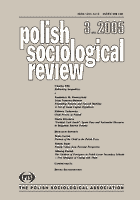Friendship Patterns and Upward Mobility: A Test of Social Capital Hypothesis
Friendship Patterns and Upward Mobility: A Test of Social Capital Hypothesis
Author(s): Irina Tomescu-Dubrow, Kazimierz M. SłomczyńskiSubject(s): Social Sciences
Published by: Polskie Towarzystwo Socjologiczne
Keywords: Friendship ties; network constrains; structural holes; social mobility; communist party membership; entreprenurship
Summary/Abstract: Abstract: In this paper, we argue that having a large number of non-redundant friends—that is, friends who do not know each other—is conducive to upward mobility. We define friendship patterns using two quantities: the number of all friends and the density of ties among friends. Applying a job-mobility model, based on the utility anticipated from a possible new job, we test the hypothesis that social capital in the form of sparse networks, also known as networks with structural holes, positively stimulates upward mobility—above and beyond social characteristics traditionally used in status attainment research. On the basis of survey data gathered in Poland, we test social capital hypotheses pertaining to change in earnings during a five-year period, 1998–2003. Our results indicate that non-redundant ties among friends influence income attainment. In addition, we find that fifteen years after the collapse of communism, having friends who were members of the communist party is an inhibitor of upward mobility, while having friends who were entrepreneurs increases people’s chances of establishing their own businesses, independently of the number of potential bridges between friends.
Journal: Polish Sociological Review
- Issue Year: 151/2005
- Issue No: 3
- Page Range: 221-237
- Page Count: 16
- Language: English

